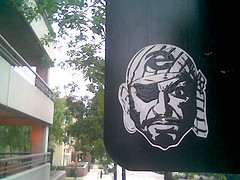 The draconian penalties for illegal downloaders under the U.S. Copyright Act were intended not just for commercial pirates, but for consumer-level infringers, the First Circuit ruled last week.
The draconian penalties for illegal downloaders under the U.S. Copyright Act were intended not just for commercial pirates, but for consumer-level infringers, the First Circuit ruled last week.
In the latest chapter of the saga of Joel Tenenbaum's battle with the world's largest record companies, First Circuit Chief Judge Sandra A. Lynch ruled on Friday that Congress intended that students such as Tenenbaum should face staggering penalties for illegal downloads. But she urged Congress to examine the "concerns" that the case raises.
The U.S. Copyright Act, at 17 U.S.C. 504(c) and on, provides awards ranging from $750 to $150,000 for each instance of willful copyright infringement. The entertainment industry has applied these provisions to go after peer-to-peer sharing groups and their users. In 2011, more than 50,000 peer-to-peer downloaders have been sued for illegally downloading in a field that has been described as the "toxic tort of the coming decades."
Beginning in 2002, the Recording Industry Association of America ("RIAA") and entertainment companies began suing individuals directly for copyright infringement, threatening them with enormous fines if they did not settle. After settling with thousands of downloaders out of court at $3,000 to $5,000 a pop, Sony BMG, Warner Bros. Records, Atlantic Records, Arista Records, and UMG Recordings came to focus on Joel Tenenbaum.
Tenenbaum was a high school student in Providence, R.I., when he began downloading songs through peer-to-peer sharing service Napster, according to the facts of the case. After Napster was shut down in a long-running copyright battle, Tenenbaum moved on to other sites. As a college student at Goucher College in Maryland, he illegally downloaded thousands of songs, and shared thousands of songs with others. He continued to do this even after Sony had threatened him with legal action, and right up until the case was filed.
In 2009, Tenenbaum, by then a grad student at Boston University, became only the second person in the country whose case went all the way to trial. In the federal court in Boston, Tenenbaum was represented by Harvard Law professor Charles Nesson, founder of the Berkman Center for Internet and Society, a defender of Daniel Ellsberg's leaking of the Pentagon Papers, and a key character on the plaintiffs' team in the Woburn, Mass., pollution case that became the basis for the book and film, A Civil Action.
Nesson focused on the unfairness of applying the Copyright Act's enormous sanctions against an individual downloading for private use. The jury did not buy it, and handed down a backbreaking $675,000 judgment for downloading and sharing 30 songs.
Stung by the defeat, Nesson then asked Judge Nancy Gertner to revisit the sanctions, and she agreed to reduce them to $67,500. Both sides appealed to the First Circuit.
The appeal became something of a clash of legal titans. In one corner was Nesson, backed by the Electronic Frontier Foundation, the Stanford Law Center for Internet and Society, and other attorneys. In the other corner stood former Solicitor General Paul Clement and the U.S. Department of Justice.
Nesson invited Judge Lynch to consider the constitutionality of the Copyright Act. Nesson also suggested that Judge Lynch interpret the Copyright Act as intending that "consumer-level" violators be held to a lower level of sanction than commercial pirates.
Clement and the Justice Department argued that Judge Lynch could - and therefore must - avoid the whole constitutional challenge and that the Copyright Act should be taken at face value as applying only one standard.
In her opinion released on Friday, Judge Lynch mostly sided with Clement. In 1999, when the Copyright Act was last revised, Congress was fully aware of the potential for peer-to-peer sharing and that the high sanctions in the Act would apply to individuals, she wrote. She cited legislative history to the Act that showed the House's concern over the growing trend of downloaders who were unaware or unconcerned about copyright infringement.
Nor was there anything in the Act that distinguishes sanctions between "consumer-level" filesharing and commercial pirating, she said. In fact, she pointed out, the word "consumer" and its synonyms never appear in the Act, and liability extends to "anyone" who infringes the copyright, including a consumer. And Congress explicitly declined to extend immunity to those who used home computers to download copyrighted materials, she wrote, citing 17 U.S.C 1001(3).
Judge Lynch took issue with the trial court's determination that statutory damages under the Act should be treated largely as punitive. Actually, the sanctions are both punitive and compensatory, Judge Lynch wrote. Consequently, the recording companies should have been given the choice between accepting the reduced sanctions or having a new trial, Lynch concluded.
Judge Lynch signaled that Congress should revisit the issue of consumer-level sanctions. But given the imbalance in persuasive power between the entertainment industry and filesharers, it is unlikely home downloaders will get relief anytime soon.
Timothy Cornell is Of Counsel at Perry, Krumsiek & Jack LLP in Boston. Before he went to law school, he worked as a journalist at the Boston Herald, the Philadelphia Inquirer, and other papers. Disclosure: Timothy represents "John Does" accused of illegally downloading copyrighted material, and their cases will likely be affected by the ruling in Tenenbaum. He is also a referral attorney for the Electronic Frontier Foundation and a member lawyer in the Online Media Legal Network at the Berkman Center.
(Image of "ePirate" courtesy of Flickr user *USB* licensed under a Creative Commons BY SA 2.0 license.)




